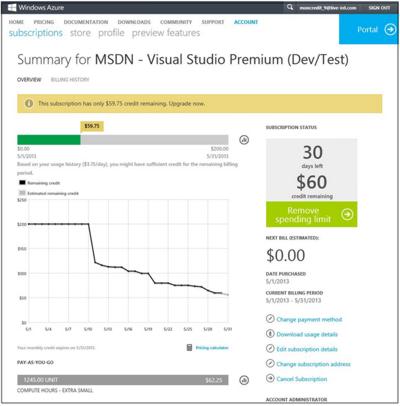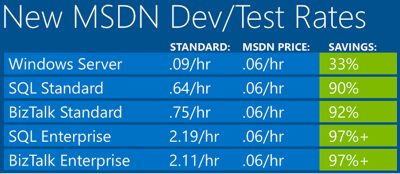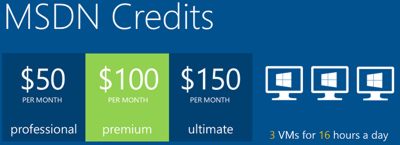| Enhancements for Windows Azure |
| Written by Sue Gee |
| Monday, 10 June 2013 |
|
Microsoft has announced several enhancements to Windows Windows Azure has a new billing model intended to make it a more attractive option as a Dev/Test environment, particularly to MSDN subscribers. Its Free Trial has also become more flexible. Many developers are keen to discover how the cloud services offered by Windows Azure would work for them and by introducing more granular billing and removing quotas on resources during the free trial Microsoft is hoping to persuade more of us to test it for ourselves. On his blog, Scott Guthrie outlines how the changes to Windows Azure charges makes it a great environment for dev/test. The new terms of the Windows Azure Free Trial are that developers get a credit of $200 per month to be applied to any service of their choice. The updated interface of the Windows Azure Management Portal also shows the remaining credit balance and the number of days left to use it which is useful for all users.
In signing up for the free trial you have to provide credit card details - and so most users will be concerned about the details of charges should they want to continue to use Azure. Here the news has to be that is you want to use Azure for Development and Testing, as opposed to Production use, then the new discount scheme for MSDN subscribers means that you need to take this into account in your calculations. Two general changes to Azure billing are that compute charges are now per minute rather than per hour and there are no compute charges for stopped VMs (virtual machines). The other important change concerns MSDN Use-Rights. While previously it wasn’t (legally) possible to use the dev/test server licenses provided with MSDN subscriptions in a hosted cloud environment, revised MSDN use-rights now allow the use of MSDN dev/test software licenses on Windows Azure. This means you can install and use MSDN dev/test server images for SQL Server, SharePoint, BizTalk, etc at no extra charge within Windows Azure VMs. To encourage MSDN subscribers to move to Windows Azure for development and testing Microsoft is offering an across-the-board rate of 6 cents per hour (or rather, given the new billing model, 0.1 cent per minute). This represents a massive discount for some services and a substantial one on others:
In addition MSDN subscribers get credits which can be spent on any Windows Azure resource being used for Dev/Test purposes. This includes virtual machines (Windows and Linux), SQL databases, web sites, mobile services, Hadoop clusters, BizTalk Services, storage and more. Scott Guthrie illustrates a number of alternative ways of spending the credit of $100 per month for the holder of an MSDN Premium subscription and his first example is three VMs for 16 hours a day. Instead you could take advantage of 80 VMs for a 20 hour load test, or 50 Hadoop cluster nodes for 10 hours or up to 100 websites plus a SQL database - for dev/test purposes only.
The new billing model will be applied automatically in August, although you opt in sooner if you are an existing MSDN subscriber and are already using Azure for dev/test. Also if you are an existing MSDN subscriber using Azure in a production environment you can continue with the previous MSDN benefits offer by opting out of the automatic conversion - the old benefits will then continue for a further 12 months. Apart from monetary incentives is there anything else by way of enhancements in Windows Azure? According to another of Scott Guthrie's blog posts, the update introduces Secure Socket Layer (SLL) encryption for custom domains, providing the ability to setup both IP Address Based SSL Bindings and SNI Based SSL Bindings. Anther improvement is to Active Directory which gains a directory sync utility that works with Windows Server 2003 and above that enables users to securely sync their directories without having to setup ADFS. Finally, Windows Azure BizTalk Services has been launched in preview giving B2B and Enterprise Application Integration (EAI) capabilities for cloud and hybrid integration solutions. It includes built-in support for managing EDI relationships between partners, and EAI bridges for integrating with SAP, SQL Server, Oracle and Siebel systems.
The more flexible free trial, the billing changes, and above all the discounts for MSDN subscribers, will probably encourage devs who until now had been hesitant to explore the potential benefits of the Windows Azure platform. But note that the incentives are for dev/test and if you want to use Azure for deployment then the standard rates apply. More InformationWindows Azure: Announcing Major Improvements for Dev/Test in the Cloud Windows Azure (general blog post) Related ArticlesWindows Azure SDK 2.0 for .NET The Red and the Blue - Azure SDK for Ruby More Features for Azure Active Directory New Azure Services for Hybrid Cloud
To be informed about new articles on I Programmer, install the I Programmer Toolbar, subscribe to the RSS feed, follow us on, Twitter, Facebook, Google+ or Linkedin, or sign up for our weekly newsletter.
Comments
or email your comment to: comments@i-programmer.info
|
| Last Updated ( Monday, 10 June 2013 ) |





